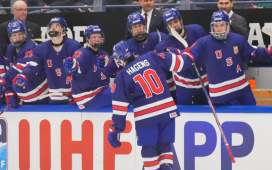With the season on the horizon and Point’s desire to get into the opening night lineup, he and the Lightning came to terms on a three-year, $20.75-million pact that followed the Bolts’ blueprint for restricted free agents.

When I see contracts such as the one Brayden Point signed with the Tampa Bay Lightning, I can’t help but harken back to five years ago when Aaron Portzline and I had a conversation with then Columbus Blue Jackets president John Davidson at the Centre Ice Arena in Traverse City, Mich. The Blue Jackets were in the midst of negotiations with Ryan Johansen and the team had just offered Johansen three contracts of varying lengths, each of them for $6 million a season. Davidson was not pleased with the way things were going.
“When (restricted free agents) have arbitration and they have unrestricted free agency, they try to take us to the woodshed,’ Davidson lamented. “So now they have no leverage and they’re trying to take us to the woodshed. You explain it to me. What are we supposed to do? We’re not being unfair. We’re following a document that’s right there in place.”
The Blue Jackets ultimately signed Johansen to a three-year bridge deal with an AAV of $4 million a year, then went on to deal him to the Nashville Predators for Seth Jones. So it’s fair to say things worked out pretty well for them.
Which brings us to Brayden Point. There was never, ever, any time when Point was going to get either the term or the money that Mitch Marner received with the Toronto Maple Leafs. And like the Maple Leafs knew with Marner, the Lightning were armed with the knowledge that Point wanted to stay where he was and he was intent on being in the lineup when the Lightning host the Florida Panthers in their first regular-season game Oct. 3.
“It was very important for Brayden to be there for the start of the season and in order to do that, he needed to be on a plane by Friday at the latest,” said Point’s agent, Gerry Johannson. “Tampa wanted him there and Brayden wanted to be in Tampa. There was no way he was not going to be in the lineup opening night.”
Lightning GM Julien BriseBois made it very clear very early on in the process that he didn’t really care about league trends and that a couple of things remained absolute: 1. Almost everyone in Tampa takes a bridge deal, and 2. He was not going to tear his roster apart to accommodate the demands of an RFA without arbitration rights whose only leverage was withholding his services and hindering his own development.
It’s amazing what teams can do when they actually stick to their guns and use the advantages afforded them in the collective bargaining agreement. In return, Point will earn an average of $6.75 million per year for a three-year total of $20.75 million, $12.25 million of which will be paid in signing bonuses. With a salary of $9 million in the last year of the deal, Point will be able to turn the CBA in his favor a couple of years down the road. With one year remaining until he hits unrestricted free agency after the contract expires, the Lightning will either have to offer him a qualifying offer of $9 million or take him to arbitration where their minimum offer would have to be at least $7.65 million. If they do neither, Point would become an unrestricted free agent.
Relatively speaking, Point will not hit the jackpot the way he hoped during this deal, but his next deal could come under terms of a new collective bargaining agreement, one where the U.S. television money is triple what it is now and new revenues are flowing in from legalized gambling.
One thing we’ve all learned from this exercise is that when it comes to signing RFAs coming off their entry-level players contracts, there is no such thing as a comparable. That’s probably why the NHL is so against giving those players arbitration rights in the first place. Toronto is going to do what it has to with Mitch Marner, Tampa did what it had to with Brayden Point and the Calgary Flames and Colorado Avalanche are going to do what suits them when it comes to Matthew Tkachuk and Mikko Rantanen, respectively.
The latter two can no longer point to Marner’s contract and demand the same term and money, because their employers can easily argue that a higher-scoring, better two-way forward who plays a more important position is earning $4 million less and got four fewer years of term than Marner.
Only nine more sleeps until the puck drops for real and the season begins and we’re now down to six RFAs who haven’t been signed. That number will be at almost zero in the next 10 days.
Want more in-depth features, analysis and an All-Access pass to the latest content? Subscribe to The Hockey News magazine.








